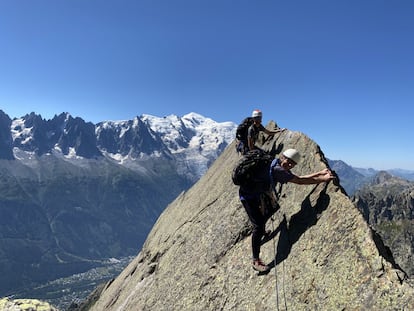From the valleys to the 14,000-foot peaks of the Alps, this summer's dog days ravage the mountains, causing endless rock slides, ice slides and the unprecedented agony of major glaciers melting like a unattended ice cream on a sidewalk.
Just to cite a couple of examples, the Argentière glacier has lost seven meters of thickness in one year, and since 2001, the Mer de Glace has lost 70 meters.
Added to the ecological disaster is a certain economic concern: mountain tourism has to adapt to the new reality while maintaining its attractiveness and avoiding in the best possible way the objective dangers of a changing playing field.
Anticipating these debates and cutting short abruptly, the mayor of the town of Saint Gervais (French Haute-Savoie), Jean Marc Peillex,
announced on August 5 its intention to request a bail of 15,000 euros from "the candidates to kill themselves" on Mont Blanc, whose classic route depends administratively on its mayor's office.
The route observes a critical section between the Tête Rousse refuge and the Goûter refuge: climbers have to cross a corridor that is highly exposed to falling rocks before reaching a protected rock spur.
This section is known as 'the bowling alley', and in hot conditions the fall of huge rock projectiles is as frequent as it is deadly, although it only takes half a minute to cross the danger.
climbers have to cross a corridor heavily exposed to falling rocks before reaching a sheltered rock spur.
This section is known as 'the bowling alley', and in hot conditions the fall of huge rock projectiles is as frequent as it is deadly, although it only takes half a minute to cross the danger.
climbers have to cross a corridor heavily exposed to falling rocks before reaching a sheltered rock spur.
This section is known as 'the bowling alley', and in hot conditions the fall of huge rock projectiles is as frequent as it is deadly, although it only takes half a minute to cross the danger.
The Chamonix guide company stopped offering this ascent to its clients in mid-July, but since the refuges were still open, many climbers agreed to the route, driving a mayor who once banned access to Mont Blanc out of his mind without reservation in any of his shelters and that he sent the police to control his decree.
Now, what the mayor intends is to "anticipate the costs of the rescue and burial of those pseudo-mountain climbers who ignore the recommendations of the authorities", a declaration of principles that has not materialized, but has stirred up to a wide sector of the world of French mountaineering.
On August 22, the newspaper
Le Monde
published a letter signed by the mayor of Chamonix, Éric Fournier, as well as by Christian Trommsdorf, president of the High Mountain Military Group or by the president of the French Federation of Mountain refuges, Bénedicte Cazenave, publicly discrediting the conduct of the mayor of Saint Gervais and reclaiming the mountain as a space of freedom against the “temptation of an absolutely safe world.
Professionals from the mountain world, politicians, professional and amateur mountaineers ask for the right to choose when we go to the mountains in a responsible, humble and free way, as stated in the document that in 2019 allowed UNESCO to distinguish the mountaineering with the title of 'intangible heritage of humanity'.
Two climbers with Mont Blanc in the background.
The signatories recall that professionals in the mountain world have now more than ever the challenge of helping to prevent accidents in the mountains using classic tools such as training, information, orientation or disclosure of the dangers derived from climate change.
Many classic alpine routes are now a death trap, but, says the letter, the solution is not to ban mountaineering in summer, but to "seek new horizons and adapt responsibly."
The guides advance the dates of their departures and look for new attractive itineraries, educating their clients along the way so that they consider other destinations than the well-trodden Mont Blanc, Matterhorn or Eiger.
There are endless mountain goals that are as suggestive as they are unknown to the uninitiated public.
The statement defends the idea of conserving the mountain “as a space of freedom against the temptation of an aseptic and absolutely safe world.
The practice of mountaineering should not be subject to obtaining permits in the French Alps, the cradle of a discipline that has seen its actors for centuries shape and transmit a true cultural heritage, the art of living briefly in a hostile nature, forging a path to sign useless conquests in freedom and responsibility”.
In France, the letter recalls, mountain relief is free and must "remain that way, so that everyone can benefit from it both in everyday life and in leisure time: no bail, no penalty, no authorization, but prevention and responsibility”.
The tribune remembers, finally,
Certainly, the mountaineering that we have known is in full mutation because, at least in the Alps, the scenario is no longer what it was.
Amateurs and professionals (such as mountain guides and the authorities in charge of safety at the peaks) adapt and diversify their approaches trying to educate and make newcomers aware by explaining the nature of the new dangers.
Putting doors on the mountain seems like a shortcut as simplistic as it is arbitrary.
You can follow EL PAÍS Deportes on
and
, or sign up here to receive
our weekly newsletter
.
50% off
Subscribe to continue reading
read without limits
Keep reading
I'm already a subscriber

